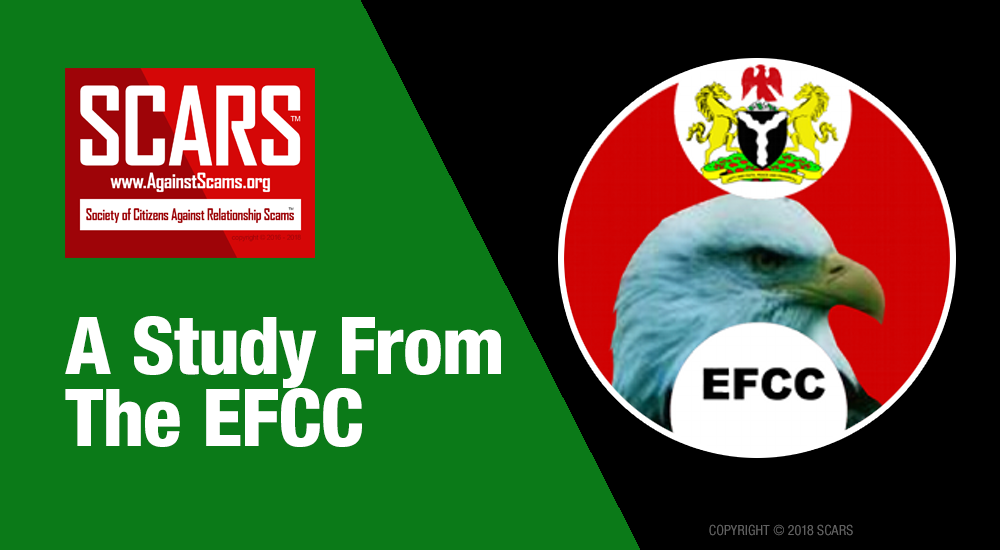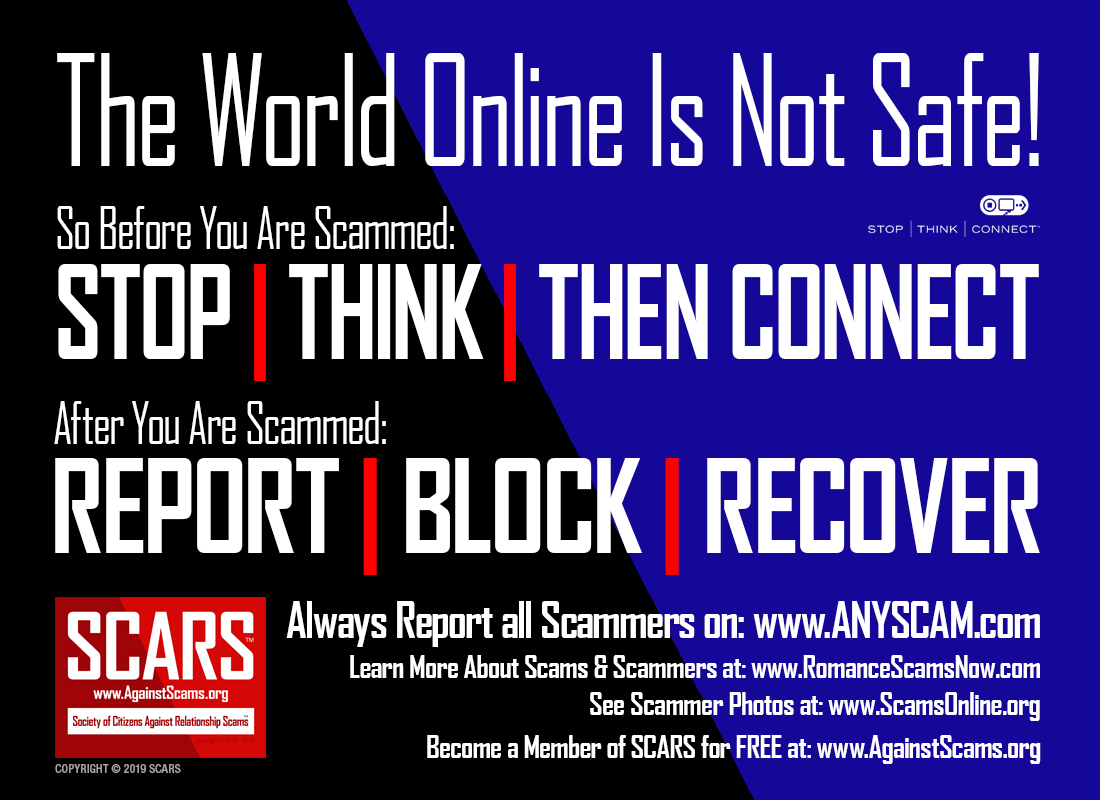SCARS™ Insight: A Cybercriminal Study – Narratives of the Nigerian Economic and Financial Crimes Commission (EFCC) Agents
For the first time, there has been a study of what it is like on the ground in Nigeria from the perspective of the Agents of the EFCC!
PLEASE NOTE; THIS IS WRITTEN FROM THE PERSPECTIVE OF THE NIGERIANS AND IS NOT NECESSARILY SENSITIVE TO SCAM VICTIMS.
ALSO NOTE THAT THERE IS VERY LITTLE ABOUT THE LARGER SCAMMING ORGANIZATIONS – THEY ARE MOSTLY IGNORED SINCE THE EFCC RARELY INTERACTS WITH THEM.
A Study by:
Suleman Lazarus is an Austrian independent scholar who is currently a visiting lecturer at the University of Greenwich, United Kingdom. He is a qualitative sociologist and his research interests include the cultural dimensions of digital crimes. While he completed an empirical study on the connections between hip hop artists and cybercriminals in 2018, one of his theoretical works in 2019 nuances “the synergy between feminist criminology and the Tripartite Cybercrime Framework.” He is also a published poet and his most recent poem is entitled, “Betrayals in Academia and a Black Demon from Ephesus.”
Geoffrey U. Okolorie is a digital forensics expert, a fraud examiner and cybercrime investigator who is currently a postgraduate research student in the UK. He is a member of the Economic and Financial Crimes Commission (EFCC), Nigeria, as well as a member of various local and international professional organizations.
Abstract
While this article sets out to advance our knowledge about the characteristics of Nigerian cybercriminals (Yahoo-Boys), it is also the first study to explore the narratives of the Economic and Financial Crimes Commission (EFCC) officers concerning them. It appraises symbolic interactionist insights to consider the ways in which contextual factors and worldview may help to illuminate officers’ narratives of cybercriminals and the interpretations and implications of such accounts. Semi-structured interviews of forty frontline EFCC officers formed the empirical basis of this study and were subjected to a directed approach of qualitative content analysis. While prior studies, for example, indicated that only a group of cybercriminals deploy spiritual and magical powers to defraud victims (i.e. modus operandi), our data analysis extended this classification into more refined levels involving multiple features. In particular, analysis bifurcates cybercriminals and their operations based on three factors: educational-attainment, modus-operandi, and networks-collaborators. Results also suggest that these cybercriminals and their operations are embedded in “masculinity-and-material-wealth”. These contributions thus have implications for a range of generally accepted viewpoints about these cybercriminals previously taken-for-granted. Since these criminals have victims all over the world, insights from our study may help various local and international agencies
- [a] to understand the actions/features of these two groups of cybercriminals better and develop more effective response strategies; and
- [b] to appreciate the vulnerabilities of their victims better and develop more adequate support schemes.
We also consider the limitations of social control agents’ narratives on criminals.
Introduction
In Nigeria, over 77% of youths live on less than USD2 per day (African Development Bank, 2018), and online and offline lives are inextricably intertwined (Lazarus, 2019a; Lazarus 2019b; Powell et al., 2018). Even though the link between offending and poverty is far from straightforward (Newburn, 2016), unemployment and poverty have strong connections with online crimes “within a given nation” (Kigerl, 2012, p. 483). What is notable is that the Nigerian youths have been disproportionately implicated in defrauding victims all over the world (Akanle et al., 2016). Internet crimes are global issues (Kirillova et al., 2017; Wall, 2007; Yar, 2017), and millions of people with email accounts have undoubtedly encountered Nigerian scam emails (Rich, 2017). Consequently, recent years have witnessed an upsurge of research on victims of cyber-fraud that supposedly originates from Nigeria (Cross et al., 2018; Owen et al., 2017; Sorell and Whitty, 2019).
We still, however, know very little about Nigerian cyber-fraudsters (Lazarus, 2018). Remarkably, no study has attempted to explore the narratives of officers who have close interactions with these cybercriminals, even though frontline law enforcement officers who routinely investigate, arrest, interview, interrogate and prosecute these cyber- fraudsters have insiders’ insights. The narratives of these frontline law enforcement officers, therefore, merit examination. This study asks: “what are the narratives of frontline law enforcement officers about cyber-fraudsters and their activities in Nigeria?”.
The bifurcation of the Nigerian cybercriminals: Narratives of the Economic and Financial Crimes Commission (EFCC) agents. Lazarus, S., & Okolorie, G. U. (2019).
ACCEPTEDANDFINALCOPYLazarusOkolorie
TAGS: SCARS, Nigeria, EFCC, Economic and Financial Crimes Commission, Anti-Scam, Scams, Scammers, Fraudsters, Cybercrime, Crybercriminals, Yahoo Yahoo, Yahoo Boys, Scam Victims,
SCARS™ Team
Society of Citizens Against Relationship Scams Inc.
A Worldwide Crime Victims Assistance Nonprofit Organization
Visit: www.AgainstScams.org
Contact Us: Contact@AgainstScams.org
PLEASE SHARE OUR ARTICLES WITH YOUR FRIENDS & FAMILY
HELP OTHERS STAY SAFE ONLINE – YOUR KNOWLEDGE CAN MAKE THE DIFFERENCE!
The Latest SCARS Posts:
FIND MORE SCAM NEWS
«SCAMCRIME.COM»
JOIN US ON FACEBOOK
«CLICK HERE»
END
MORE INFORMATION
– – –
Tell us about your experiences with Romance Scammers in our
« Scams Discussion Forum on Facebook »
– – –
FAQ: How Do You Properly Report Scammers?
It is essential that law enforcement knows about scams & scammers, even though there is nothing (in most cases) that they can do.
Always report scams involving money lost or where you received money to:
- Local Police – ask them to take an “informational” police report – say you need it for your insurance
- U.S. State Police (if you live in the U.S.) – they will take the matter more seriously and provide you with more help than local police
- Your National Police or FBI « www.IC3.gov »
- The SCARS|CDN™ Cybercriminal Data Network – Worldwide Reporting Network on « www.Anyscam.com »
This helps your government understand the problem, and allows law enforcement to add scammers on watch lists worldwide.
– – –
To learn more about SCARS visit « www.AgainstScams.org »
Please be sure to report all scammers
on « www.Anyscam.com »
Disclaimer:
SCARS IS A DIGITAL PUBLISHER AND DOES NOT OFFER HEALTH OR MEDICAL ADVICE, LEGAL ADVICE, FINANCIAL ADVICE, OR SERVICES THAT SCARS IS NOT LICENSED OR REGISTERED TO PERFORM.
IF YOU’RE FACING A MEDICAL EMERGENCY, CALL YOUR LOCAL EMERGENCY SERVICES IMMEDIATELY, OR VISIT THE NEAREST EMERGENCY ROOM OR URGENT CARE CENTER. YOU SHOULD CONSULT YOUR HEALTHCARE PROVIDER BEFORE FOLLOWING ANY MEDICALLY RELATED INFORMATION PRESENTED ON OUR PAGES.
ALWAYS CONSULT A LICENSED ATTORNEY FOR ANY ADVICE REGARDING LEGAL MATTERS.
A LICENSED FINANCIAL OR TAX PROFESSIONAL SHOULD BE CONSULTED BEFORE ACTING ON ANY INFORMATION RELATING TO YOUR PERSONAL FINANCES OR TAX RELATED ISSUES AND INFORMATION.
This content and other material contained on the website, apps, newsletter, and products (“Content”), is general in nature and for informational purposes only and does not constitute medical, legal, or financial advice; the Content is not intended to be a substitute for licensed or regulated professional advice. Always consult your doctor or other qualified healthcare provider, lawyer, financial, or tax professional with any questions you may have regarding the educational information contained herein. SCARS makes no guarantees about the efficacy of information described on or in SCARS’ Content. The information contained is subject to change and is not intended to cover all possible situations or effects. SCARS does not recommend or endorse any specific professional or care provider, product, service, or other information that may be mentioned in SCARS’ websites, apps, and Content unless explicitly identified as such.
The disclaimers herein are provided on this page for ease of reference. These disclaimers supplement and are a part of SCARS’ website’s Terms of Use.
Legal Notices:
All original content is Copyright © 1991 – 2020 Society of Citizens Against Relationship Scams Inc. (D.B.A SCARS) All Rights Reserved Worldwide & Webwide. Third-party copyrights acknowledge.
SCARS, SCARS|INTERNATIONAL, SCARS, SCARS|SUPPORT, SCARS, RSN, Romance Scams Now, SCARS|INTERNATION, SCARS|WORLDWIDE, SCARS|GLOBAL, SCARS, Society of Citizens Against Relationship Scams, Society of Citizens Against Romance Scams, SCARS|ANYSCAM, Project Anyscam, Anyscam, SCARS|GOFCH, GOFCH, SCARS|CHINA, SCARS|CDN, SCARS|UK, SCARS|LATINOAMERICA, SCARS|MEMBER, SCARS|VOLUNTEER, SCARS Cybercriminal Data Network, Cobalt Alert, Scam Victims Support Group, are all trademarks of Society of Citizens Against Relationship Scams Inc., All Rights Reserved Worldwide
Contact the law firm for the Society of Citizens Against Relationship Scams Incorporated by email at legal@AgainstScams.org











Leave A Comment